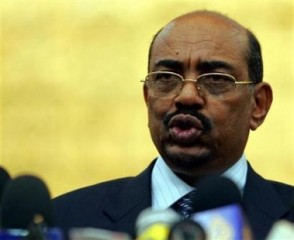AMSTERDAM, (Reuters) – Sudan today dismissed allegations President

had deposited up to $9 billion overseas, saying it was impossible because of sanctions.
Chief prosecutor of the International Criminal Court (ICC) Luis Moreno-Ocampo told Reuters today, after the allegations appeared in a leaked U.S. diplomatic cable:
“I am investigating the financial aspects and we have information about Bashir’s money. I can confirm that it is up to $9 billion.”
Moreno-Ocampo is pursuing a case against Bashir accusing him of masterminding genocide and war crimes in Sudan’s western province of Darfur.
The cable published by WikiLeaks suggested disclosure of Bashir’s wealth could turn Sudanese opinion against him.
“In my experience as a prosecutor, when you have these types of crimes, if they steal money it helps to delegitimise them,” Moreno-Ocampo told Reuters.
Asked whether he expected Bashir to be arrested soon, he said: “I’m sure it’s just a matter of time.”
He added: “I have requested the arrest, but I cannot implement the arrest, it’s the government of Sudan’s mandate.”
Bashir refuses to recognise the international court and has continued to travel, despite arrest warrants issued by ICC judges. His defiance has gained him support in Sudan, especially in the Muslim north where many are suspicious of the West.
“It is just propaganda — Ocampo using false information to create political pressure,” said information ministry official Rabie Abdelati, a senior member of Bashir’s National Congress Party (NCP).
“I don’t think President Bashir has a bank account in Europe or America or the Arab world. If President Bashir had a bank account in his name or anther name it would be very easy for them to confiscate it,” Abdelati told Reuters in Khartoum.
“We are challenging them to say where the money is kept. If they can find this account then we give them license to take the money inside it as a prize.”
Another senior Sudanese official, who asked not to be named, said: “It is incorrect and cannot be possibly be true.
“Sudan is heavily sanctioned. There is a lot of surveillance around Sudan. How could President Bashir put this amount in a Western bank?”
In the cable published by WikiLeaks, diplomats quoted Moreno-Ocampo as saying “Lloyd’s Bank in London” might be holding Bashir’s funds or know their location.
Asked about Lloyds <LLOY.L> today, the prosecutor said: “The money is not in Lloyds, the connection is that they (Lloyds) have some official accounts with the government of Sudan” and therefore might be able to help with information.
A Lloyds spokesperson told Reuters: “We have absolutely no evidence to suggest there is any connection between Lloyds Banking Group and Mr Bashir. The group’s policy is to abide by the legal and regulatory obligations in all jurisdictions in which we operate.”
The United States imposed economic sanctions on Sudan in 1997 over its human rights record and alleged sponsorship of terrorism and tightened them further in 2007 in response to the conflict in Darfur.
The U.S. sanctions froze all Sudanese government assets inside the United States.
Britain and the European Union have not imposed sanctions. But U.S. authorities have become increasingly aggressive towards European banks dealing with people linked to Sudan.
Last year, Lloyds agreed to forfeit $350 million over charges that it faked records so that clients from Iran, Sudan and elsewhere could do business in the U.S. banking system.








